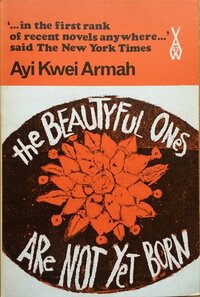You need to sign in or sign up before continuing.
Take a photo of a barcode or cover
I'm not sure what rating to give it, I was unsure what I was exactly reading until I got 100 pages in. It felt like Virginia Woolf but in Ghana and in the perspective of the unnamed main character. Perhaps its more towards 4 stars than 3. Such an unusual read, another book I'm glad I read.
challenging
dark
emotional
slow-paced
Plot or Character Driven:
Character
Strong character development:
Complicated
Loveable characters:
Complicated
Diverse cast of characters:
Yes
Flaws of characters a main focus:
Yes
It definetly is a slow paced book, especially at the beginning but the last third of the book is way faster to read because suddenly things happen! I liked the book for its portray of corruption in Ghana in the last days of Nkrumahs government and I think it was wise in giving comments on the aspects of power, moral and how to keep your moral integrity when everyboy around you is telling you you are acting morally wrong. Still only 3 stars because the story had its lengths.
dark
slow-paced
Plot or Character Driven:
Character
Strong character development:
Complicated
Flaws of characters a main focus:
Complicated
"The Beautyful Ones Are Not Yet Born" is an extremely well written existential novel that should be taught side-by-side with Sartre and Camus. I found it dark and endlessly insightful. Ayi Kwei Armah covers a lot of deeply seeded social issues in Africa regarding war, wealth, and corruption. Here are some great quotes:
"When the war was over the soldiers came back to homes broken in their absence and they themselves brought murder in their hearts and gave it to those nearest them."
"But perhaps the living dead could take some solace in the half-thought that there were so many others dead in life with them. So many, so frighteningly many, that maybe in the end even the efforts one made not to join them resulted only in another, more frustrating kind of living death."
"When the war was over the soldiers came back to homes broken in their absence and they themselves brought murder in their hearts and gave it to those nearest them."
"But perhaps the living dead could take some solace in the half-thought that there were so many others dead in life with them. So many, so frighteningly many, that maybe in the end even the efforts one made not to join them resulted only in another, more frustrating kind of living death."
A rather depressing - but not inaccurate - account of the state of Ghana in the years after independence during Nkrumah's rule, while also touching on the time right before and after this period. Ayi Kweh Armah writes about a warped world where those who choose to remain uncorrupted are the ones seen as in the wrong, where selfish material gain supercedes any desire for progress, where political change is only reflected in a shifting in leadership while leaving unaltered any tangible effects on the poor - and yet he does it so hauntingly beautifully that you are left with the same sense of despair and interminable vacuousness that 'the man' must surely feel.
Set in Ghana, I found most of what I read really relatable. Even though it was during the days when colonialism was still fresh, most of what I read was a clear picture of corruption and how citizens coped with it. “In another country they would be in jail. Here they are heroes”
“Yes. I feel like a criminal. Often these days I find myself thinking of something sudden I could do to redeem myself in their eyes. Then I sit down and ask myself what I have done wrong, and there is really nothing.”
“You have not done what everybody is doing,” said the naked man, “and in this world that is one of the crimes. You have always known that.”_ one man’s attempt to act with integrity has made him a “criminal “ he does not get the respect from his wife or his in law. He is seen as someone who is not ready to do whatever it takes to provide lavish lifestyle for his family.
Even though there was not much mention of the country’s first president the writer made it really clear that it was that era. Citizens lamented about how power was given to people who were supposed to save them and give them victory and then turned on them and enriched themselves at the expense of the people who gave them power.
Most of the book dealt about life’s questions especially in poverty, corruption, drug use even and family relations.
I particularly liked that the protagonist was without a name. It gave me a sense of solidarity and I couldn’t help but empathise with him. He also showed a great sense of character and helped his classmate who had become a “party man” and had alienated everyone.
The occasional mention of latrine and its vivid descriptions always added some humour for me.
I however found this book a bit difficult to read in the beginning. I did not get a sense of a build up to a climax. There was too much details and long descriptions and sometimes it dragged on for many sentences. But everything did serve a purpose though . Eventually.
“Yes. I feel like a criminal. Often these days I find myself thinking of something sudden I could do to redeem myself in their eyes. Then I sit down and ask myself what I have done wrong, and there is really nothing.”
“You have not done what everybody is doing,” said the naked man, “and in this world that is one of the crimes. You have always known that.”_ one man’s attempt to act with integrity has made him a “criminal “ he does not get the respect from his wife or his in law. He is seen as someone who is not ready to do whatever it takes to provide lavish lifestyle for his family.
Even though there was not much mention of the country’s first president the writer made it really clear that it was that era. Citizens lamented about how power was given to people who were supposed to save them and give them victory and then turned on them and enriched themselves at the expense of the people who gave them power.
Most of the book dealt about life’s questions especially in poverty, corruption, drug use even and family relations.
I particularly liked that the protagonist was without a name. It gave me a sense of solidarity and I couldn’t help but empathise with him. He also showed a great sense of character and helped his classmate who had become a “party man” and had alienated everyone.
The occasional mention of latrine and its vivid descriptions always added some humour for me.
I however found this book a bit difficult to read in the beginning. I did not get a sense of a build up to a climax. There was too much details and long descriptions and sometimes it dragged on for many sentences. But everything did serve a purpose though . Eventually.
This is some of the best writing I’ve ever read in my LIFE. Even if you aren’t a fan of political/social literature, this book is worth it just for the way Ayi Kwei Armah sews this world together.
This was my read the world selection for Ghana
“The man” (this is what the main character is referred to in the book….not even “The Man”, but “the man”) is a railway freight clerk in Ghana in the period following Independence in the 1960s. The man is a person of integrity and morals at a time when bribery is rife and most people can be bought.
Our man however, won’t be bought, much to the disgust of his wife and mother-in-law who want all the nice European things that everyone with lesser values has. This book is a satirical attack on Ghanaian society during this time.
Although I appreciated this book and what it had to say, I did not really enjoy the journey. This is a difficult book to read. It is very wordy and descriptive to the point of tediousness.
The author gives the reader many detailed descriptions of excrement and every other bodily fluid imaginable which I imagine is to highlight the view that the author sees society as filthy, however these were pretty disgusting to read - do not eat or snack whilst reading this book
“The man” (this is what the main character is referred to in the book….not even “The Man”, but “the man”) is a railway freight clerk in Ghana in the period following Independence in the 1960s. The man is a person of integrity and morals at a time when bribery is rife and most people can be bought.
Our man however, won’t be bought, much to the disgust of his wife and mother-in-law who want all the nice European things that everyone with lesser values has. This book is a satirical attack on Ghanaian society during this time.
Although I appreciated this book and what it had to say, I did not really enjoy the journey. This is a difficult book to read. It is very wordy and descriptive to the point of tediousness.
The author gives the reader many detailed descriptions of excrement and every other bodily fluid imaginable which I imagine is to highlight the view that the author sees society as filthy, however these were pretty disgusting to read - do not eat or snack whilst reading this book



